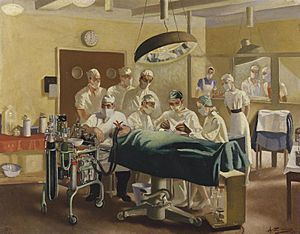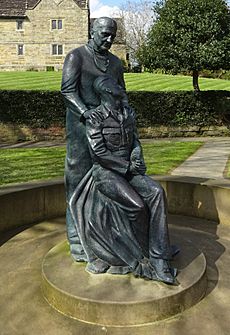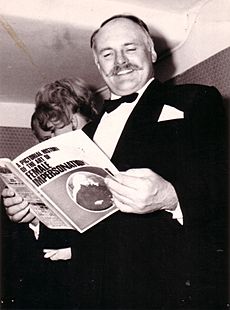Guinea Pig Club facts for kids
The Guinea Pig Club was a special group formed in 1941. It was a social club and support network for British and allied aircrew who were badly injured during World War II.
Members of the club were patients of a famous surgeon named Archibald McIndoe. They were treated in Ward III at Queen Victoria Hospital in East Grinstead, Sussex. These patients had undergone new types of reconstructive plastic surgery, often to fix severe burns they got in plane crashes. The club continued to be active even after the war ended. Their yearly meetings went on until 2007.
Contents
Why the Name "Guinea Pig"?
The name "Guinea Pig" was chosen because these small animals are often used in science experiments. This reflected how new and experimental the surgery techniques were at East Grinstead. Just a few years before, many of these injuries would have been deadly. The hospital itself was even nicknamed "the Sty," like a pigsty.
How the Club Started

The club began informally in June 1941 with 39 patients. It quickly became a place for them to socialise and support each other. Dr. McIndoe fully supported the club. Members included aircrew patients from Ward III and the surgeons and anaesthetists who treated them. To join, aircrew had to be serving airmen who had undergone at least two surgeries. By the end of the war, the club had 649 members.
Most of the first members were Royal Air Force (RAF) aircrew with severe burns, especially on their faces or hands. While most were British, many others came from Canada, Australia, New Zealand, America, France, Russia, Czech Republic, and Poland. In 1943, a special Canadian section was built at the hospital. This was paid for by the Royal Canadian Air Force.
Early in the war, many patients were fighter pilots. But by the end, about 80% were from bomber crews. A few members had other injuries, like face damage from crashes. Some even joined after the war from peacetime accidents, as the ward stayed open until 1948.
Before the war, the RAF had set up special burns units. At East Grinstead, McIndoe and his team developed many new ways to treat and rebuild burn victims. They handled very serious injuries. For example, one air gunner, Les Wilkins, lost his face and hands. McIndoe even recreated his fingers by making cuts between his knuckles.
McIndoe knew many patients would stay in the hospital for years. They would need many operations. He wanted their lives to be as normal and happy as possible. He cared a lot about helping patients return to everyday life. They were allowed to wear their own clothes or uniforms instead of hospital gowns. They could also leave the hospital whenever they wanted. Local families were encouraged to welcome them. The people of East Grinstead were asked to treat them normally. Because of this, East Grinstead became known as "the town that didn't stare."
The Guinea Pig Club was a big part of these efforts. It made hospital life easier and helped patients mentally prepare for life outside. There were even barrels of pale ale in the wards. This helped rehydrate patients who were very dehydrated from their injuries. It also helped create a friendly and happy atmosphere.
Later, many men served in other RAF roles, like in control rooms. Some even flew planes between their surgeries. Those who couldn't serve still received full pay until their last operation. Only then were they released from service. McIndoe also loaned some patients money to help them start their civilian lives.
The club even had its own magazine, The Guinea Pig. It was first published in April 1944.
After the War
The club did not close when the war ended. It continued to meet for over sixty years. It offered practical help and a strong sense of community to former patients. The Guinea Pig magazine was also published until 2003. Annual meetings in East Grinstead brought visitors from all over the world.
McIndoe was made the club's president for life when it started. After he passed away in 1960, Prince Philip, Duke of Edinburgh, became the new president. Geoffrey Page was the first chairman. Tom Gleave served as the only "Chief Guinea Pig" until he died in 1993.
In 2001, for the club's 60th anniversary, members decided to keep holding reunions until only 50 members were left. By 2004, there were 120 survivors. By 2007, there were 97 members left, ranging in age from 82 to 102. The year 2007 marked the last reunion. Over 60 people attended. But because of the members' age and health, they decided to close the club down. By April 2015, there were believed to be 29 survivors, and 17 by November 2016.
Club Symbol (Brevet)
The club's symbol, or "brevet," showed a guinea pig with large RAF "wings". There were two main designs. One showed the guinea pig sitting upright, like a pilot. The other showed a more natural guinea pig on all fours.
Club Anthem
The words to the club's song were written by Edward "Blackie" Blacksell. They were inspired by an old World War I song. The song was sung to the tune Aurelia, which is also used for the hymn "The Church's One Foundation".
We are McIndoe's army,
We are his Guinea Pigs.
With dermatomes and pedicles,
Glass eyes, false teeth and wigs.
And when we get our discharge
We'll shout with all our might:
"Per ardua ad astra"
We'd rather drink than fight.
John Hunter runs the gas works,
Ross Tilley wields the knife.
And if they are not careful
They'll have your flaming life.
So, Guinea Pigs, stand ready
For all your surgeons' calls:
And if their hands aren’t steady
They’ll whip off both your ears.
We've had some mad Australians,
Some French, some Czechs, some Poles.
We've even had some Yankees,
God bless their precious souls.
While as for the Canadians –
Ah! That’s a different thing.
They couldn’t stand our accent
And built a separate Wing.
We are McIndoe’s army,
(As first verse)
Legacy and Impact
Sixteen members of the club wrote books about their experiences. Some of these were written during the war. The most famous book was Richard Hillary's The Last Enemy (1942). It helped many people learn about McIndoe's important work.
One pub in East Grinstead was named "The Guinea Pig." It closed in 2008. The land was later used for a housing development called Guinea Pig Place.
A painted list of all the members, called a Roll of Honour, is displayed in the Canadian Wing at Queen Victoria Hospital.
A bronze statue honoring McIndoe was unveiled in East Grinstead in 2014. It was made by Martin Jennings, whose own father was a Guinea Pig. The statue shows an airman sitting with his injured hands. Behind him stands McIndoe, with a comforting hand on each of the airman's shoulders.
In November 2016, a monument honoring the club members was unveiled. This happened at the National Memorial Arboretum in Staffordshire. Prince Philip, the club's president, was there for the unveiling.
An exhibition celebrating the club members opened at East Grinstead Museum in December 2016. Four club members attended the opening.
In 2017, the Guinea Pig Club directly inspired the creation of the CASEVAC Club. This is a similar support group for service members badly injured in the Iraq and Afghan wars of the 21st century.
Notable Members
- George Bennions (1913–2004)
- Harold Bird-Wilson (1919–2000)
- Robert Boscawen (1923–2013)
- Bob Doe (1920–2010)
- Jimmy Edwards (1920–1988)
- Bill Foxley (1923–2010)
- Tom Gleave (1908–1993)
- Richard Hillary (1919–1943)
- Colin Hodgkinson (1920–1996)
- Josef Koukal (1912–1980)
- Eric Lock (1919–1941)
- Jackie Mann (1914–1995)
- Geoffrey Page (1920–2000)
- Richard Pape (1916–1995)
- Alois Šiška (1914–2003)
- Frankie Truhlar (1917–1946)
- Robert Wright (1906–1992)
In Books and Shows
Charles MacLean, who was a Guinea Pig himself, wrote a novel called The Heavens are not too High in 1957. It tells the story of a fighter pilot who gets severe burns.
A play called Guinea Pig Club was performed at York Theatre Royal in 2012. It focused on McIndoe's work.
An episode of the TV show Foyle's War (series 3, episode 2, "Enemy Fire" from 2004) showed a grand house turned into a burns unit. Patients there were encouraged to drink beer, wear their own clothes, and organise fun activities. McIndoe is mentioned in the episode.
Joseph Randolph Richard's novel Incendo (2015) tells the story of a badly burned pilot and his time in the club.
A film titled The Guinea Pig Club, starring Richard E. Grant as McIndoe, was reportedly planned for production in 2018.
See also
- Mollie Lentaigne, a medical artist and nurse at East Grinstead who made drawings of McIndoe's procedures
 | Bayard Rustin |
 | Jeannette Carter |
 | Jeremiah A. Brown |




